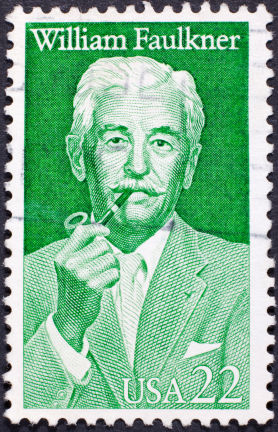In this class, we spent some time quietly writing each day. I was working on a medieval story involving a knight and some poison he invented to take revenge on someone or other, and I remember looking up at some point, trying to think of something completely random to put in the story, and my eyes settled on the poster-portrait of William Faulkner near the classroom door. So William Faulkner made it into the story. I had absolutely no idea who the guy was. Turns out he was an author, something I learned a few years later.
 |
| This reminds me of the poster. Maybe it's the same image? Not sure. It's been a long time. |
As for what I thought of it: Immediately after finishing the book, I thought, "Oh good, it's over. ...Did I really just think that?!" Following that, I went online and looked up a summary for the book to make sure I hadn't misunderstood the major plot points, because Faulkner definitely does not hang road signs on them. Good news: I hadn't.
Faulkner presents this story in a way that if you aren't paying strict attention, you have no idea what is going on. The writing is minimalist and written in what people call stream of consciousness. I think they're wrong and it's actually just first person with a talkative narrator each time, except for when the narrator isn't being talkative. Imagine a 5-year-old telling you a story, and how they will repeat themselves until they get it right, add in unnecessary detail, and completely skip parts, and then add a southern dialect and word choice to it. That's what it is like to read this book. Ish. It takes a lot of skill to write like this, actually, so that is one thing I'll give Faulkner props in. I'll have to talk myself into reading another book of his if I want to find more reasons to give him props.
The one thing I really want to tell Faulkner is that people cannot possibly be this stupid, because the father in this piece was straight up asinine. But I'm afraid he may prove me wrong, and that's something about this world I would rather not be aware of.
This is not a book to read for fun unless you are a literary fiction junky. Please note the difference between literary and genre fiction. Genre fiction is anything with a label: science fiction, fantasy, historical fiction, horror, mystery, etc. Literary fiction is everything else, so long as it is written well. I don't think you can really publish in literary fiction if the writing is well done, though. Examples of contemporary-ish literary fiction you might have heard of (you'll have to give me a moment to think on this one): The Great Gatsby, The Kite Runner, Life of Pi. I had to cheat and use an Internet search to jog my mind.
On the upside, I now understand that English professor (the one who recommended it) a whole lot better. Like, everything makes sense now. About him. As for the book, I understood and could probably analyze its literary merit if asked to, but I'd rather not.

No comments:
Post a Comment